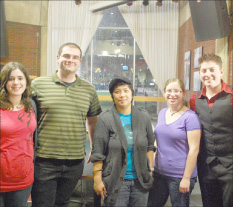
By Betsy Jinks
Correspondent
Kay Barrett may be a lot of things — happa (one Asian American parent, one non-Asian parent), transgendered, martial artist, queer, poet — but quiet is not one of them.
This Tuesday, Barrett came to the College to perform some of his poetry at the Rathskeller, and despite being sick with a bad cough, still gave a strong performance.
Barrett’s poetry chronicled everything from being in love, being the son of an immigrant mother from the Philippines, abusive relationships and the need inside every person to be who they really are.
“(The record company asked), ‘You’re gay, do you just have the gay poem?’ ‘You’re Asian, do you just have the Asian poem?’” Barrett recalled of trying to get his first CD made.
Barrett said he hoped his audience “could see identity as being complicated.”
Barrett started writing poetry at a young age, when his mother and grandfather would write poetry with him. Barrett also attributes his success as a poet to mentors “who have really grown me.”
PRISM invited Barrett to perform as part of Queer Awareness Month, which has been hosting events throughout October.
Barrett opened his show by placing a tubel — a Philippino scarf — on the ground. Audience members were then asked to think of a loved one and place their memory on the scarf so that the performance would be dedicated to them.
Between the seven poems Barrett performed throughout the night he would talk to the audience. Topics ranged from his current relationship to his girlfriend of five years to stories of drunk people criticizing his work.
Occasionally, Barrett would poll the audience, for example, having people raise their hand if they “have a crush” or “are in love.”
Barrett’s first poem was “Uncertain.” He spoke of his mother and her struggles as an immigrant, and Barrett’s own struggles with his identity.
Next was “Beloved,” a tribute to Barrett’s girlfriend, followed by “Foreign,” which attacked the negative connotations of the word and claimed it is “not a system of identity,” or that a person is not simply defined by one characteristic.
“Since My Body” was the next poem, described by Barrett as much “heavier” than his other works. It talked about sexual assault and abuse in the gay community, something Barrett says he believes is not talked about enough.
After that was “Letter to My Unborn,” which was directed towards Barrett’s hypothetical future child.
“Rhythm is a Dancer” was about a now-closed LGBT club in Chicago which Barrett said allowed LGBT youth to be who they really were and not who they were expected to be at home.
Barrett closed with “Homeboys and Butches Don’t Write Enough Poems,” encouraging LGBT youth to express themselves.
After his readings, Barrett held a brief question and answer session with audience members, then sold copies of his CD, “As My Body.”






